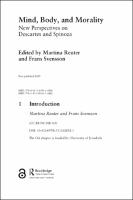Chapter 1 Introduction
Proposal review
| dc.contributor.author | Reuter, Martina | |
| dc.contributor.author | Svensson, Frans | |
| dc.date.accessioned | 2022-02-09T10:02:37Z | |
| dc.date.available | 2022-02-09T10:02:37Z | |
| dc.date.issued | 2019 | |
| dc.identifier.uri | https://library.oapen.org/handle/20.500.12657/52692 | |
| dc.description.abstract | The turn of the millennium has been marked by new developments in the study of early modern philosophy. In particular, the philosophy of René Descartes has been reinterpreted in a number of important and exciting ways, specifically concerning his work on the mind-body union, the connection between objective and formal reality, and his status as a moral philosopher. These fresh interpretations have coincided with a renewed interest in overlooked parts of the Cartesian corpus and a sustained focus on the similarities between Descartes’ thought and the philosophy of Baruch Spinoza. Mind, Body, and Morality consists of fifteen chapters written by scholars who have contributed significantly to the new turn in Descartes and Spinoza scholarship. The volume is divided into three parts. The first group of chapters examines different metaphysical and epistemological problems raised by the Cartesian mind-body union. Part II investigates Descartes’ and Spinoza’s understanding of the relations between ideas, knowledge, and reality. Special emphasis is put on Spinoza’s conception of the relation between activity and passivity. Finally, the last part explores different aspects of Descartes’ moral philosophy, connecting his views to important predecessors, Augustine and Abelard, and comparing them to Spinoza. | en_US |
| dc.language | English | en_US |
| dc.subject.classification | thema EDItEUR::Q Philosophy and Religion::QD Philosophy::QDH Philosophical traditions and schools of thought::QDHR Western philosophy from c 1800 | en_US |
| dc.subject.other | Martina Reuter, Frans Svensson, Deborah Brown, Mikko Yrjönsuuri, Karolina Hübner, Lisa Shapiro, Valtteri Viljanen, Peter Myrdal, Arto Repo, Olli Koistinen,John Carriero, Tomas Ekenberg, Calvin Normore, Denis Kambouchner, Lilli Alanen, René Descartes, Baruch Spinoza, mind-body union, personal identity, François Poulain de la Barre, non-embodied vision, Meditations, sensory perception, Optics, the self, activity, passivity, self-consciousness, essence constitution, ideas, knowledge, reality, Leibniz, Cartesian cognition, res extensa, intuition, Augustine, Abelard, good, evil, morality, solid contentment, virtue, wisdom | en_US |
| dc.title | Chapter 1 Introduction | en_US |
| dc.type | chapter | |
| oapen.identifier.doi | 10.4324/9781351202831-1 | en_US |
| oapen.relation.isPublishedBy | 7b3c7b10-5b1e-40b3-860e-c6dd5197f0bb | en_US |
| oapen.relation.isPartOfBook | 33ae3a52-ec71-4a60-9a34-defc5cff7886 | en_US |
| oapen.relation.isbn | 9780815384946 | en_US |
| oapen.relation.isbn | 9781032093529 | en_US |
| oapen.imprint | Routledge | en_US |
| oapen.pages | 14 | en_US |
| oapen.remark.public | The OA chapter is funded by: University of Jyväskylä | |
| peerreview.anonymity | Single-anonymised | |
| peerreview.id | bc80075c-96cc-4740-a9f3-a234bc2598f1 | |
| peerreview.open.review | No | |
| peerreview.publish.responsibility | Publisher | |
| peerreview.review.stage | Pre-publication | |
| peerreview.review.type | Proposal | |
| peerreview.reviewer.type | Internal editor | |
| peerreview.reviewer.type | External peer reviewer | |
| peerreview.title | Proposal review | |
| oapen.review.comments | Taylor & Francis open access titles are reviewed as a minimum at proposal stage by at least two external peer reviewers and an internal editor (additional reviews may be sought and additional content reviewed as required). |

